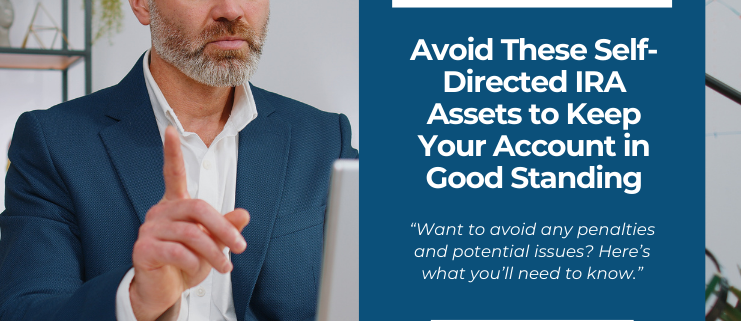Avoid These Self-Directed IRA Assets to Keep Your Account in Good Standing
Arts. Collectibles. Life insurance policies. Owning these in an investment portfolio can give you all sorts of security in economic uncertainty—after all, they’re not correlated with the stock market. And while the appeal of a Self-Directed IRA is that it helps you open your portfolio to assets beyond the traditional stocks and bonds, that doesn’t mean any asset can go into your IRA. You’ll have to avoid collectibles like wine, fine art pieces, and life insurance policies if you want to keep your account in good standing with the IRS. Want to avoid any penalties and potential issues? Here’s what you’ll need to know.
Collectibles in a Self-Directed IRA: More Than Just Art and Wine
Collectibles encompass more than just high-end art pieces or rare wines. The IRS’s list includes stamps, coins (with some exceptions for certain bullion coins), gems, antiques, rugs, and alcoholic beverages. While those might seem like investments to you…they’re not retirement investments that will earn tax protection. And while these items might hold personal or historical value and can sometimes appreciate significantly over time, the bottom line is that they’re not permitted in Self-Directed IRAs.
The IRS considers these assets too difficult to value consistently, creating challenges in assessing fair market value for tax purposes. Instead, if you’re looking to invest in tangible items, you might consider options like precious metals, which are allowed under specific guidelines.
Life Insurance Policies
Life insurance policies are strictly off-limits in any type of IRA, including Self-Directed IRAs. The IRS has prohibited this asset primarily because life insurance provides a personal benefit that doesn’t align with the purpose of an IRA—which, after all, is to generate and protect retirement income. Owning life insurance in a retirement account could create conflicts around beneficiary designations and taxable distributions, so the IRS bars it altogether. For insurance-related investments, consider companies within the insurance industry or financial services instead. Your life insurance policy should exist outside the IRA.
Any Property You Use Personally
Another prohibited category in Self-Directed IRAs is personal use property. This includes assets such as vacation homes, residential property for personal use, or any item that you or your family might benefit from directly. If you use it personally, it’s not a retirement property. While real estate can be a valuable IRA asset, it must strictly serve as an investment—meaning you can’t reside in it, use it as a vacation spot, or even rent it out to family members. Want real estate exposure in your Self-Directed IRA? Then make sure the property is strictly for rental income or resale at a profit.
Closely Held Companies and Prohibited Transactions
One of the attractions of Self-Directed IRAs is the ability to invest in private businesses. However, investing in a closely held company (such as a family-owned business) can lead to prohibited transactions if you or disqualified persons (family members or business partners) receive any form of benefit from the investment.
That’s a good rule of thumb: any personal benefits from the retirement account that occur before retirement are off-limits. For instance, if you own shares in your family business within your IRA and receive any payment or benefits from the business, you could unintentionally trigger a prohibited transaction. This can result in the entire IRA becoming taxable. To avoid this, stick to businesses that are entirely separate from your personal or family interests.
Want to know more about how to keep an account in good standing? Contact a Self-Directed IRA administration firm that knows all about it: reach out to us here at American IRA by dialing 866-7500-IRA.


